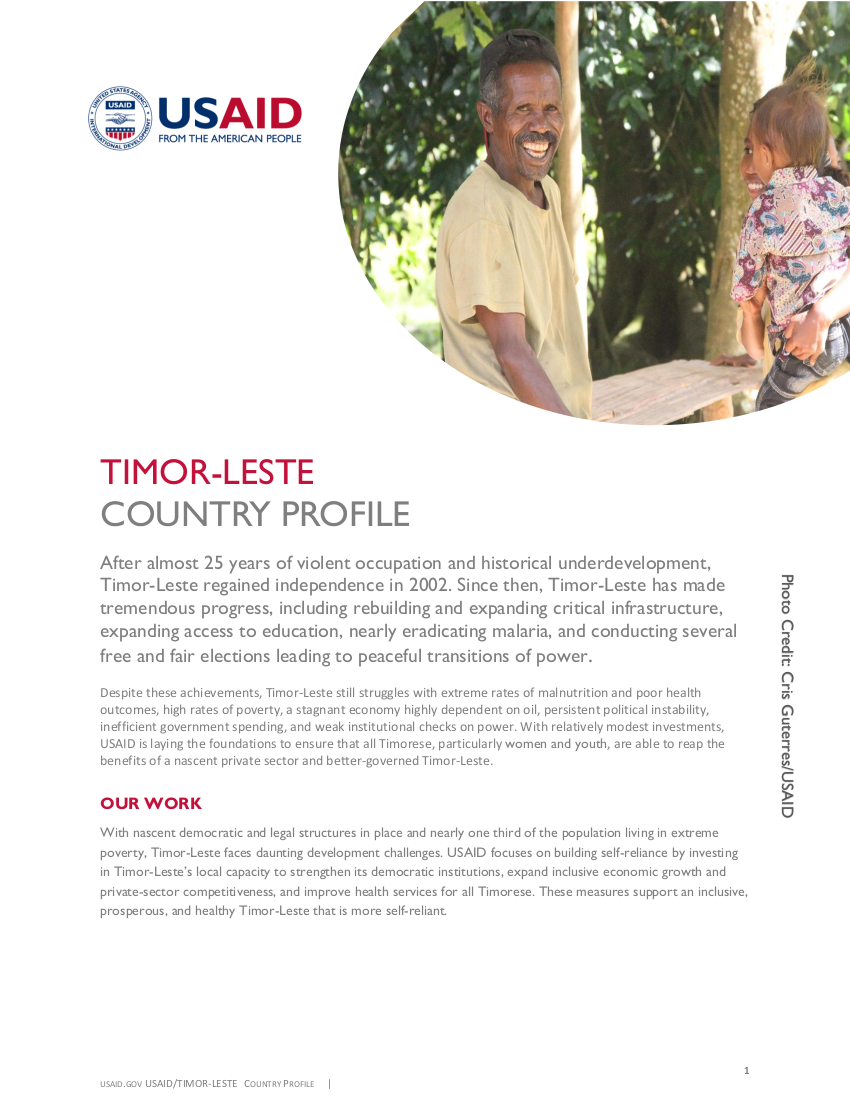Speeches Shim
After almost 25 years of violent occupation and historical underdevelopment, Timor-Leste regained independence in 2002. Since then, Timor-Leste has made tremendous progress, including rebuilding and expanding critical infrastructure, expanding access to education, nearly eradicating malaria, and conducting several free and fair elections leading to peaceful transitions of power.
Despite these achievements, Timor-Leste still struggles with extreme rates of malnutrition and poor health outcomes, high rates of poverty, a stagnant economy highly dependent on oil, persistent political instability, inefficient government spending, and weak institutional checks on power. With relatively modest investments, USAID is laying the foundations to ensure that all Timorese, particularly women and youth, are able to reap the benefits of a nascent private sector and better-governed Timor-Leste.
USAID/Timor-Leste Country Profile ![]() (pdf - 425k)
(pdf - 425k)
ECONOMIC GROWTH AND TRADE
USAID helps build an inclusive, sustainable economy by expanding economic opportunities for women and youth, strengthening the private sector in key growth sectors, and enabling an environment for private sector growth. With USAID assistance, community-based tourism is expanding, farmer productivity is increasing, digital infrastructure and policy is being forged, and natural resource management is improving with private sector-led recycled plastic market initiatives. Thanks in part to USAID’s introduction of modern technology and farming techniques, farmers’ incomes in target areas rose by 1,100 percent from $235 to $2,661 per month from 2015 to 2020. Over 7,000 youth have participated in USAID agriculture activities, and over 32,000 individuals have transitioned from subsistence farming to commercial farming.
GOVERNANCE
Despite remarkable progress, Timor-Leste’s maternal and under-five mortality rates remain the highest in Southeast Asia. To help save lives, USAID works to expand access to high-quality health services for all Timorese–especially women and children–encouraging best health practices and quality reproductive health care. USAID efforts helped boost the percentage of women who delivered their babies in a health facility from 38 percent in 2016 to 62 percent in 2020. To sustain these successes, USAID will expand assistance to health systems strengthening and health governance by increasing human capacity within the sector.
Still-fragile institutions pose major obstacles as Timor-Leste works to forge a resilient and representative democracy. USAID promotes good governance by strengthening institutional effectiveness and increasing citizen participation. With USAID assistance, Timor-Leste held peaceful elections in 2017 and 2018 without international supervision, customs reform is underway, and parliamentarians are learning best practices to effectively represent their constituents. High quality non-governmental organizations can help hold the government accountable through transparency and responsiveness to the public interest, while supporting sound, just, and responsive governance.
LEARN MORE
Last updated: September 15, 2021



Comment
Make a general inquiry or suggest an improvement.